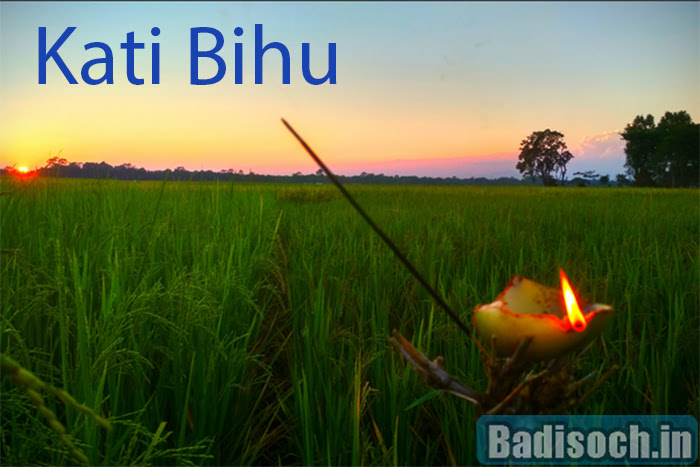Kati Bihu 2024 : Kati Bihu, a festival celebrate by the Assamese people on the first day of the ‘Kati’ month, typically occurring in mid-October. This year, Kati Bihu 2024 is schedule for October 18. The festival marks the transfer of rice crops and the beginning of a new harvest season. Kati Bihu is observe as a time of reflection, penance, and hope for a better future. While it is celebrated throughout Assam, each tribe has its unique customs and interpretations of the day.
It signifies an important period for the agricultural sector in Assam, as rice is one of its major crops and plays a significant role in its economy. During this time, farmers offer prayers to their deities seeking blessings for a fruitful harvest season. On this auspicious occasion, people light lamps or candles in front of their homes to ward off negative energy and bring in prosperity. The day is also marked with traditional delicacies such as pitha (rice cakes) and laru (sweet balls made of coconut).
Kati Bihu 2024
Kati Bihu is a significant festival celebrate in Assam, India. During this festival, the Tulsi plant is wash and place on an earthen platform known as the “Tulsi Bheti.” Offerings and prayers are made to the goddess Tulsi for the well-being of the family and a prosperous harvest. This ritual is continue throughout the month of Kati. To mark this occasion, various parts of the house are illuminate with lights or saaki (candles). The main lamp is lit in the courtyard, near the revere Tulsi plant. This festival highlights Assam’s rich culture and traditions and brings families together to celebrate and offer gratitude.
Farmers in the paddy fields use a specific type of lamp call ‘Akaxh Banti’ or Sky candle. These lamps, made of mustard oil, are place on the tips of tall bamboo poles. During Kati Bihu 2024, also known as the “Poor” or “Kongali” festival, when the granaries are empty and food is scarce, these lamps serve a practical purpose by attracting insects to the flame and thereby protecting the crops. Additionally, there is a belief that lighting these lamps helps guide the souls of ancestors to heaven.
Kati Bihu 2024 Details
| Article Name | Kati Bihu 2024 |
| Category | News |
| Official Website | Click Here |
 |
|
| Telegram |
Also Check: Srd.Sassa.Gov.Za Status Check 2024
History Of Kati Bihu
Kati Bihu, also known as Kongali Bihu, is a special event that takes place in the north-eastern Indian state of Assam. It is observe in the middle of October and is characterize by a solemn atmosphere. The festival focuses on the restrictions of the month, resulting in minimal celebration among spectators. Despite being an important national holiday, Kati Bihu does not have a festive spirit but rather serves as a remembrance of the previous year. In Assam, October marks the beginning of the sowing season, symbolize by empty granaries and newly growing paddy fields, representing “Kangal” or being “broke” in Hindi.
Kati Bihu is consider one of the Assamese people’s top three significant festivals, alongside Bhogali Bihu and Rongali Bihu. During this festival, individuals illuminate clay lamps outside their residences, while also adorning the holy basil plant with lights and garlands. The tradition of lighting these lamps dates back to ancient celebrations when lanterns place in the paddy fields acte as a natural pesticide by attracting insects towards them. To guide the way to their ancestors’ house, a traditional lantern known as Saaki is place on baboon sticks.
Check Here: Rajasthan Voter List 2024
How To Observe Kati Bihu 2024?
Light a lamp
Clay lamps are us in the Assamese tradition. As we place them on the plant, we pray to Goddess Tulsi for a bountiful harvest and the well-being of our family. These lamps represent the everlasting flame of optimism and the ability to turn dreams into reality. The ceremony takes place during the entire month of Kati.
Learn Bihu dance
Bihu, which is a traditional dance of Assam and an integral part of its culture, can be easily learn and is a great way to get some exercise. To make your Kati Bihu experience even more enjoyable, consider learning a few steps from YouTube.
Say a prayer before your meal
To commemorate the occasion, it is customary to offer a prayer of gratitude before partaking in a meal. Express appreciation for the land and the farmers who cultivate the food we consume. Kati Bihu centers around the harvest of rice, during which the tribes bestow blessings upon the soil and seek divine intervention for a flourishing spring season.
Look Here: Erica Robin Miss Universe Pakistan, Becomes First Miss Universe Pakistan 2024
Beautiful Traditions And Rituals of the Kati Bihu Festival
The meat feast
In Assam, people in the north prefer duck meat while those in the south prefer pigeon meat on overcast days. This variation is due to availability, cultural traditions, and personal taste. Both meats are nutritious, with duck being high in protein and minerals like iron and zinc, and pigeon meat rich in vitamins B12 and B6 for nerve function and blood cell production.
The gamosa gift
In Assamese culture, hospitality is important. It is customary to offer a “gamosa” to every guest. A gamosa is a hand-made towel adorn with traditional designs. It symbolizes respect, love, and friendship and is given as a gesture of welcome. Gamosas are also us in ceremonies and are part of Assamese attire.
The tri-holiday celebration
Assam celebrates Rongali Bihu, Bhogali Bihu, and Kati Bihu in addition to Bohag Bihu. Rongali Bihu marks the Assamese New Year in mid-April. Bhogali Bihu, also known as Magh Bihu or Bhujia, is observe in January and involves feasting on traditional delicacies. Kati Bihu, also call Kongali Bihu or Kangali Bihu, is a low-key celebration in October-November. Festivities include lighting lamps and praying for a good harvest season.
The touch of Tulsi
Saaki, or earthen lamps, are an important part of Indian culture. They are lit on auspicious occasions, such as when the Tulsi plant is worship. The Tulsi plant holds great significance in Hindu mythology and is believe to bring prosperity and good health. Lighting saaki around it symbolizes its importance and shows respect. The warm glow of the lamp enhances the serene atmosphere of the ritual.
The dance of persistence
The day concludes with the Assamese traditional dance call Bihu, which serves as a symbol of community unity, even though it is not a festive occasion.
Read More: Top 5+ Best Short Stories in Hindi with Moral for Kids
Why Kati Bihu Is Important?
It honors the nature
Kati Bihu is a celebration of nature’s bounty, symbolizing the beginning of fall and the harvest cycle. It reminds us of our dependence on the environment and offers an opportunity to express gratitude for nature’s gifts.
It reminds us to be grateful
Basic needs are often underestimate until scarcity hits. The planting season serves as a reminder to appreciate nature and sustainable farming practices for food security. It’s a time to acknowledge the hard work in agriculture and reconnect with the earth.
It connects us to our roots
Kati Bihu, a festival in Assam, celebrates our cultural heritage and agricultural importance. Families gather to share meals and quality time, honoring their ancestors and the land. They prepare routes from fields to homes to welcome spirits. This ritual honors our past, cherishes traditions, and recognizes agriculture’s value.
Conclusion
Kati Bihu, also known as Kangali Bihu or the Festival of the Poor, is an important agricultural festival celebrated in Assam, India. It falls in the month of October and marks the completion of the sowing season. During Kati Bihu, prayers are offered to Goddess Lakshmi, seeking her blessings for a bountiful harvest. This festival holds great significance for farmers and rural communities, as it is a time to express gratitude for the crops that have been planted and to pray for their successful growth. The celebration involves lighting earthen lamps in front of tulsi plants and chanting hymns to bring prosperity and good fortune. Additionally, people light bonfires and offer prayers to ancestors for their blessings and protection.
Kati Bihu FAQ’S
Why is Kati Bihu a special occasion?
Kongali Bihu, also known as the relocation of rice saplings, is a festival celebrated in Assam that is closely associated with agriculture. It is one of the three Bihu festivals observed in the region. During Kati Bihu, individuals commemorate this occasion by illuminating earthen lamps and candles, placing particular emphasis on lighting a diya near the Tulsi plant.
Where is Kati Bihu?
Kati Bihu will be celebrated throughout Assam on Wednesday 18 October 2024.
How do we celebrate Kati Bihu?
The festival of 'Kati Bihu' in Assam involves the tradition of lighting a lamp in front of a tulsi tree/plant. It is also referred to as Kongali Bihu or Kati Bihu, named after the month of Kartik, which is traditionally known as Kati.
Why is Kati Bihu important?
The Bihu festival represents the movement of the rice harvest, which is a crucial phase in the life cycle of paddy crops. In order to ward off malevolent spirits and pests, farmers light candles at the base of the Tulsi plant in their homes, spin a bamboo piece in the fields, and engage in rowa-khowa chants.
Related Post:
Benefits of Third Party Insurance
When Earth Day is Celebrated 2024
